

|
|
Removed parameters. | Use this bot. Report bugs. | #UCB_CommandLine
|
||
| (173 intermediate revisions by 56 users not shown) | |||
| Line 1: | Line 1: | ||
{{Short description|Network of sustainable sanitation organizations}} |
|||
{{Advert|date=March 2008}} |
|||
{{Use dmy dates|date=December 2020}} |
|||
[[File:Susana-logo.png|thumb|Logo of the Sustainable Sanitation Alliance]] |
|||
The '''Sustainable Sanitation Alliance (SuSanA |
The '''Sustainable Sanitation Alliance''' ('''SuSanA''') is a loose network of organizations who are "working along the same lines towards achieving [[sustainable sanitation]]".<ref name="website 1">{{Cite web|url=http://www.susana.org/en/about/vision-mission|title=Vision|website=Sustainable Sanitation Alliance|accessdate=8 November 2017}}</ref> It began its work in 2007, one year before the [[United Nations]] [[International Year of Sanitation]] in 2008. The intention of creating SuSanA was to have a joint label for the planned activities for 2008 and to align the various organizations for further initiatives. |
||
SuSanA has over 360 partner organizations and over 13,000 individual members (as of March 2021).<ref name=":2">{{cite web|title=Partners|url=http://www.susana.org/en/partner|accessdate=22 March 2021|website=Sustainable Sanitation Alliance}}</ref><ref name=":1">{{cite web|title=Discussion forum statistics|url=http://forum.susana.org/forum/statistics|accessdate=22 March 2021|website=Discussion Forum|publisher=Sustainable Sanitation Alliance}}</ref> SuSanA's vision document contains a definition of sustainable sanitation which was developed by SuSanA partners in 2007.<ref>SuSanA (2008). [http://www.susana.org/en/resources/library/details/267 Towards more sustainable sanitation solutions - SuSanA Vision Document]. Sustainable Sanitation Alliance (SuSanA)</ref> The discussion forum that is hosted by SuSanA performs like a [[Community of Practice]] (CoP). |
|||
A joint road map of sustainable sanitation related activities for the IYS was developed in the first two meetings of the alliance by participants from more than 30 multi- and bilateral organisations, [[NGO]]s and research institutions. The roadmap consists mainly of a series of thematic working groups that will jointly elaborate a range of publications on sustainable sanitation issues, will organise or contribute to international events and will contribute to develop new funding instruments as well as sustainable sanitation capacity building and program initiatives. |
|||
SuSanA is not a [[non-governmental organization]] (NGO). It has no legal structure and takes no membership fees. It encourages other organizations to join the network and to become active members in the thematic working groups. |
|||
SuSanA is not a new organisation, but rather a loose network of organisations working along the same lines, and open to others who want to join and be active in the promotion of sustainable sanitation systems. The Sustainable Sanitation Alliance invites other international, regional and local organisations to join the network, contribute ideas, and to become active members in the thematic working groups. Feedback for the advancement of the joint road map is certainly appreciated, as it is work in progress that will be continuously up-dated, and will include all joint activities leading towards an increased implementation of sustainable sanitation systems. |
|||
The SuSanA secretariat is funded by the [[Federal Ministry of Economic Cooperation and Development|German Ministry for Economic Cooperation and Development]] which has commissioned the [[Deutsche Gesellschaft für Internationale Zusammenarbeit]] (GIZ) for this task. Other SuSanA partners make contributions for example by paid time of their staff members. Between 2012 and 2018, co-funding for the online Discussion Forum, project database, Wikipedia editing and other improvements to the SuSanA website was provided by the [[Bill & Melinda Gates Foundation|Bill and Melinda Gates Foundation]]. |
|||
== Objectives == |
|||
== Overview == |
|||
The overall goal of the SuSanA is to contribute to the achievement of the [[MDGs]] by promoting sanitation systems which are taking into consideration all aspects of sustainability (health, environment & natural resources, technology & operation, financial & economic issues, socio-cultural & institutional aspects). The MDGs and the UN’s “International Year of Sanitation 2008” are highly appreciated by the “Sustainable Sanitation Alliance” as they help push [[sanitation]] high up in the political agenda. The main focus of the work of the SuSanA will be to promote the implementation of sustainable sanitation systems in large scale water and sanitation programmes, in line with the strategies proposed e.g. by [[WHO]], [[UNDP]]-PEP, UNSGAB, and [[UNESCO]]. |
|||
[[File:Sustainable Sanitation Alliance (SuSanA) Discussion Forum logo.png|thumb|Sustainable Sanitation Alliance (SuSanA) Discussion Forum logo]] |
|||
[[File:Group photo at 18th SuSanA meeting in Stockholm, Sweden.jpg|thumb|SuSanA members at 18th SuSanA meeting in Stockholm, Sweden]] [[File:13th SuSanA meeting in Kigali - group photo.jpg|thumb|SuSanA members at the 13th SuSanA meeting in Kigali, Rwanda, in 2011]] |
|||
[[File:SuSanA booth (5966367379).jpg|thumb|SuSanA booth at AfricaSan in Kigali, Rwanda, in 2011]] |
|||
[[File:Uschi Eid (5966925098).jpg|thumb|Uschi Eid (UNSGAB) at SuSanA seminar at AfricaSan in Kigali, Rwanda, in 2011]] |
|||
[[File:Roland Schertenleib at SuSanA core group and key stakeholder meeting in Eschborn, Germany (18th-20th of April 2013).jpg|thumb|Presentation by one of the founding fathers, Roland Schertenleib, at SuSanA core group and key stakeholder meeting in Eschborn, Germany, in 2013]] |
|||
[[File:Meeting of working group 1 on capacity development at 16th SuSanA meeting.jpg|thumb|Meeting of one of the SuSanA working groups at 16th SuSanA meeting in Stockholm, Sweden]] |
|||
SuSanA is dedicated to achieving the [[Sustainable Development Goals]], and in particular SDG6 (Goal Number 6) which is "water and sanitation for all".<ref name="website 1" /> This is done by promoting [[sustainable sanitation]] systems. These systems should be "economically viable, socially acceptable, technically and institutionally appropriate, and protect health, the environment and natural resources".<ref name="website 2">{{Cite web|url=http://www.susana.org/en/about/vision-mission|title=Sustainable sanitation|website=Sustainable Sanitation Alliance|accessdate=8 November 2017}}</ref> |
|||
SuSanA is one of several knowledge management platform in the [[WASH]] sector such as the [[LinkedIn]] Discussion Group "Community of Practice on Sanitation and Hygiene in Developing Countries" by [[Water Supply and Sanitation Collaborative Council|WSSCC]] (now defunct), Blue Planet, [[International Water Association]] (IWA), Akvopedia and others.<ref>Cranston, P. (2014). [http://www.susana.org/en/resources/library/details/2023 Knowledge Management and Building Demand for Sanitation]. Final report from a consultancy assignment for Bill & Melinda Gates Foundation (BMGF) water, sanitation, and hygiene (WASH) program, Euforic Services, Oxford, UK</ref> |
|||
General objectives of the SuSanA are therefore: |
|||
===Activities=== |
|||
* to raise awareness around the globe of what sustainable sanitation approaches are and to promote them massively; |
|||
Since 2007, SuSanA has held 23 meetings in different locations around the world. Each year one meeting takes place before or after the [[World Water Week in Stockholm]], and a further meeting usually takes place in the [[Global South]], connected to another WASH event. SuSanA also organises side events, seminars and working group meetings in conjunction with other major [[WASH]] conferences.{{cn|date=April 2023}} |
|||
* to highlight how important sustainable sanitation systems are as a precondition to achieve a whole series of MDGs (e.g. to reduce child mortality, to promote gender equity and empower women, to ensure environmental [[sustainability]], to improve livelihood, and to reduce poverty); |
|||
* to show that sanitation projects must be planned with participation of all [[Stakeholder (general)|stakeholders]] at an early stage, must respond to the initiative and preferences of the users, and that these need to go hand in hand with [[hygiene]] promotion and [[capacity building]] activities for sustainable water and wastewater management. |
|||
SuSanA members are contributing to [[Wikipedia]] articles on WASH-related topics.<ref name=":5">{{Cite web|url=https://www.sei-international.org/press/press-releases/3771|title=Join the SuSanA Sanitation Wikipedia project|date=10 October 2017|website=Stockholm Environment Institute (SEI)|access-date=9 November 2017}}</ref> They are particularly active just before two [[List of international observances|international observance days]]: [[World Water Day]] on 22 March and [[World Toilet Day]] on 19 November.<ref>{{Cite web|url=https://www.sei-international.org/-news-archive/3642|title=SuSanA seeks volunteers to upgrade Wikipedia sanitation pages|date=9 March 2017|website=Stockholm Environment Institute (SEI)|access-date=8 November 2017}}</ref><ref name=":5" /> They have also set up a list of "[[List of abbreviations used in sanitation]]".<ref name="website 3">{{Cite web|url=http://www.susana.org/en/knowledge-hub/shared-learning/glossary|title=Glossary and Wikipedia|website=Sustainable Sanitation Alliance|accessdate=8 November 2017}}</ref> |
|||
Specific activities of the SuSanA are: |
|||
=== Funding sources === |
|||
* to collect and compile information which will assist decision makers (including the civil society) to assess different sanitation systems and technologies with regard to the full range of sustainability criteria so that informed decisions can be taken; |
|||
* to demonstrate that sanitation systems can contribute to reaching the MDGs beyond sanitation, and consequently present a change of paradigm from purely disposal oriented to rather reuse oriented sanitation; |
|||
* to give examples of “smart (and less smart) practice” in sanitation for the “International Year of Sanitation 2008” and beyond; |
|||
* to identify and describe the mechanism to up-scale implementation of these examples and develop new financing instruments for pro-poor sanitation provision; |
|||
* to develop global and regional visions of how sustainable approaches can be used to promptly reach the sanitation MDG and to promote them in the IYS 2008 and beyond. |
|||
SuSanA has no legal structure, budget nor income. Partners contribute time and resources from their own budgets. The SuSanA secretariat is funded by the [[Federal Ministry of Economic Cooperation and Development|German Ministry for Economic Cooperation and Development]] (BMZ) who has commissioned the [[Deutsche Gesellschaft für Internationale Zusammenarbeit]] (GIZ) GmbH. Between 2012 and 2018, co-funding for the online Discussion Forum and other improvements to the SuSanA platform was provided by the [[Bill & Melinda Gates Foundation|Bill and Melinda Gates Foundation]].<ref name=":0" /><ref>Elisabeth von Muench, Dorothee Spuhler, Trevor Surridge, Nelson Ekane, Kim Andersson, Emine Goekce Fidan, Arno Rosemarin (2013) [http://www.susana.org/_resources/documents/default/2-2042-ssp-17okt20134-10-about-the-gates-sanitation-grants-on-forum.pdf Sustainable Sanitation Alliance members take a closer look at the Bill & Melinda Gates Foundation's sanitation grants], Sustainable Sanitation Practice Journal, Issue 17, pp. 4–10</ref><ref>{{Cite web|url=https://sanitationupdates.wordpress.com/2016/11/04/sustainable-sanitation-alliance-grant-of-2-7-million-to-supercharge-sustainable-sanitation-knowledge-platform/|title=Sustainable Sanitation Alliance: Grant of $2.7 million to supercharge sustainable sanitation knowledge platform|date=4 November 2016|publisher=Sanitation Updates|access-date=9 December 2016}}</ref> |
|||
== Meetings == |
|||
Several active core group partners, for example [[Stockholm Environment Institute|SEI]], seecon, [[Bremen Overseas Research and Development Association|BORDA]], [[Swiss Federal Institute of Aquatic Science and Technology]], [[International Water Association|IWA]], and [[WASTE]], have also funded various travel costs of SuSanA members, seminars, the printing of SuSanA publications and so forth.<ref name=":0" /> |
|||
Meetings held so far: |
|||
* 29/30-01-2007: Kick-off Meeting for the promotion of sustainable sanitation / ecosan within the IYS in Eschborn, Germany. Hosted by gtz. |
|||
* 16/17-04-2007: 2<sup>nd</sup> steering group meeting of the Sustainable Sanitation Alliance for the promotion of sustainable sanitation within the IYS 2008 in Dübendorf, Switzerland. Hosted by Eawag/Sandec. |
|||
* 11/12-08-2007: 3<sup>rd</sup> meeting of the Sustainable Sanitation Alliance in Stockholm, Sweden, just before the Stockholm Water Week. Hosted by SEI. |
|||
* 3/4-11-2007: 4<sup>th</sup> meeting of the Sustainable Sanitation Alliance in Delhi, India, just after the World Toilet Summit. Hosted by IWWA and Sulabh. |
|||
* 16/17-02-2008: 5<sup>th</sup> meeting of the Sustainable Sanitation Alliance in Durban, South Africa, attached to the Worldbank-WSP AfricaSan conference. Hosted by the Water and Research Commission, South Africa. |
|||
* 5 to 7-05-2008: 6<sup>th</sup> meeting of the Sustainable Sanitation Alliance in New York, USA, in proximity to the 16th session of the Commission on Sustainable Development. Hosted by Ashoka. |
|||
* 22 to 24-08-2008: 7<sup>th</sup> meeting of the Sustainable Sanitation Alliance in Stockholm, Sweden, within the frame of the Stockholm World Water Week 2008 (August 17th to 23rd). |
|||
* 2/4-11-2008: 8<sup>th</sup> meeting at the World Toilet Summit in Macao, China. |
|||
In 2020, the [[Water Supply and Sanitation Collaborative Council]] announced a stronger collaboration with SuSanA by merging their Community of Practice group into the SuSanA Discussion Forum, including financial support to the moderation of the SuSanA Discussion Forum.<ref>{{Cite web|url=https://www.wsscc.org/2020/01/08/wsscc-announce-merger-of-community-of-practice-platform-with-susana/|title=WSSCC announce merger of "Community of Practice" platform with SuSanA|date=8 January 2020|website=WSSCC - News|access-date=24 January 2020}}</ref> |
|||
=== Impacts === |
|||
Upcoming meetings: |
|||
The activities of the SuSanA network have contributed to increasing awareness about [[sustainability]] in the sanitation sector. SuSanA members were active in the [[Post-2015 Development Agenda]] and helped to shape the [[Sustainable Development Goals]] where Goal Number 6 now includes a goal of universal use of sustainable sanitation services that protect [[public health]] and dignity.{{cn|date=April 2023}} |
|||
Other actors have picked up on the theme of innovative sanitation (often with [[reuse of excreta]] in some form), most notably the Bill and Melinda Gates Foundation. Sustainable sanitation has become a topic in the nexus (water, energy, food) dialogue as well as in the WASH and nutrition theme.<ref>{{Cite journal |last=Gates |first=Bill&Melinda |date=15 June 2022 |title=Water, sanitation & Hygiene |journal=Bill&Melinda Journal}}</ref> |
|||
* 16/17-05-2009: 9<sup>th</sup> meeting of the Sustainable Sanitation Alliance in Addis Ababa, Ethiopia, in proximity to the <ref>[http://www.wedcconference.co.uk/call_for_papers.php 34<sup>th</sup> WEDC International Conference]</ref> "Water, Sanitation and Hygiene: Sustainable Development and Multisectoral Approaches" (18-22 May 2009). |
|||
* 22/23-08-2009: 10<sup>th</sup> meeting of the Sustainable Sanitation Alliance in Stockholm, Sweden, within the frame of the Stockholm World Water Week 2009 (August 17th to 23rd). |
|||
SuSanA fulfills an "intermediary role" in a global innovation system. It was found to be a "prime mover" in the development of "safely managed non-grid sanitation''".''<ref name=":4">{{Cite journal|last1=van Welie|first1=Mara J|last2=Boon|first2=Wouter P C|last3=Truffer|first3=Bernhard|date=2020|title=Innovation system formation in international development cooperation: The role of intermediaries in urban sanitation|url=https://academic.oup.com/spp/advance-article/doi/10.1093/scipol/scaa015/5740778|journal=Science and Public Policy|language=en|volume=47|issue=3|pages=333–347|doi=10.1093/scipol/scaa015|issn=0302-3427|doi-access=free}}</ref> |
|||
== Partners == |
|||
==Structure== |
|||
*[http://www.aee-intec.at AEE INTEC] - AEE - Institute for Sustainable Technologies (Austria) |
|||
=== Thematic working groups === |
|||
*[[Albert Ludwigs University of Freiburg|Albert-Ludwigs-Universität]], [http://www.geographie.uni-freiburg.de/ipg/forschung/ap1/ Section on Applied Geography of the Tropics and Subtropics], Freiburg i. Br. (Germany) |
|||
SuSanA has 13 thematic working groups covering areas of [[sustainable sanitation]] where conceptual and knowledge management work is required:<ref>{{Cite web|url = http://www.susana.org/en/working-groups/overview|title = Overview of the working groups|accessdate = 3 March 2015|publisher = Sustainable Sanitation Alliance}}</ref> |
|||
*Alter-Eco - Corporación Alternativas Ecológicas, Cali, Colombia |
|||
# [[Capacity building|Capacity development]] |
|||
*[http://www.uni-weimar.de Bauhaus University Weimar], Germany |
|||
# Market development |
|||
*BEWOF, Better World Foundation, Cameroon |
|||
# Renewable energies and [[climate change]] |
|||
*BGR - Federal Institute for Geosciences and Natural Resources (Germany) |
|||
# Sanitation systems, technology options, [[hygiene]] and health – includes [[hand washing]] |
|||
*[[BOKU]] - University of Natural Resources and Applied Life Science, Vienna (Austria) |
|||
# [[Food security]] and productive sanitation systems ([[reuse of excreta]]) |
|||
*Cap-Net - Capacity Building for Integrated Water Resources Management |
|||
# Cities and planning |
|||
*[http://www.eawag.ch/index Eawag-Sandec] - Swiss Federal Institute for Aquatic Science and Technology – Department of Water Supply and Sanitation in Developing Countries |
|||
# Community, rural and schools (with gender and social aspects) – includes [[community-led total sanitation]] |
|||
*[http://www.ecosan.at ESCA] - EcoSan Club Austria |
|||
# Emergency and reconstruction situations ([[emergency sanitation]]) |
|||
*Ecosanlac - Ecological Sanitation in Latin America and the Caribbean |
|||
# Public Awareness, [[advocacy]] and civil society engagement |
|||
*EcoSanRes Programme - Ecological Sanitation Research Programme (Sweden) |
|||
# Operation and maintenance |
|||
*GTO - German Toilet Organization |
|||
# Groundwater protection – includes [[groundwater pollution]] issues |
|||
*[[GTZ]] - German Development Cooperation Agency (Germany); [http://www.gtz.de/ecosan GTZ-ecosan programme] |
|||
# [[WASH]] and nutrition – includes issues on [[malnutrition]] |
|||
*IEES - International Ecological Engineering Society |
|||
# [[Behavior change (public health)|Behavior change]] |
|||
*IRC - International Water and Sanitation Centre (Netherlands) |
|||
*[http://www.iridra.com IRIDRA]- Constructed wetlands and Sustainable Integrated Water Management - Engineering, R&D (Italy) |
|||
*ITAS - Institute for Technology Assessment and System Analysis (Germany) |
|||
*IWA-SG - International Water Association – Specialist Group on Resources Oriented Sanitation (EcoSan) |
|||
*IWWA Indian Water Works Association |
|||
*Meda-Water - Euro-Mediterranean Regional Water Programme for Local Water Management |
|||
*[[Stockholm Environmental Institute|SEI]] - Stockholm Environmental Institute |
|||
*[[SIDA]] - Swedish International Development Agency |
|||
*NHN - Nature Healing Nature |
|||
*TU-Delft - Technical University of Delft |
|||
*TTZ - Technology Transfer Centre Bremerhaven (Germany) |
|||
*UEssex - University of Essex |
|||
*[http://www.ecosan.no UMB]- Norwegian University for Life Science |
|||
*[[UNDP]] - United Nations Development Programme |
|||
*[[UNESCO-IHE]] - United Nations Educational, Scientific and Cultural Organisation – Institute for Water Education |
|||
*[http://www.unhabitat.org/ UN-Habitat] - United Nations Human Settlements Programme |
|||
*Waste - Advisers on Urban Environment and Development (Netherlands) |
|||
*WB-WSP - [[Worldbank]] - Water and Sanitation Programme |
|||
*WECF - Women in Europe for a Common Future |
|||
*[[WSSCC]] - Water Supply and Sanitation Collaborative Council (Switzerland) |
|||
*WTC - World Toilet College |
|||
*[[WTO]] - World Toilet Organization (Singapore) |
|||
*[[Xavier University (Cagayan de Oro)|Xavier University]], [http://puvep.xu.edu.ph/ Periurban Vegetable Project (PUVeP)], Cagayan de Oro (Philippines) |
|||
== |
=== Partner organizations === |
||
SuSanA has over 360 partner organizations (as of March 2021).<ref name=":2" /> The partners are of the following types: Local NGO, International NGO, private sector, research and education, governmental / state-owned organization, multi-lateral organizations, associations and networks and others.<ref name=":0">SuSanA (2019). [http://www.susana.org/en/resources/library/details/1302 A standard set of Powerpoint slides to explain SuSanA]. SuSanA Secretariat, located at GIZ, Eschborn, Germany</ref> All prospective new SuSanA partner organizations have to agree to the vision document when they join.{{cn|date=April 2023}} |
|||
{{reflist|2}} |
|||
A [[social network analysis|network analysis]] study conducted in 2014 assessed the SuSanA network by examining the communication channels used and the quality of relationships among partners.<ref name=":3">{{cite web|last1 = Saffer|first1 = Adam|title = Sustainable Relationships within the Sustainable Sanitation Alliance: SuSanA Network Analysis Report|url = https://www.academia.edu/12048446|publisher = University of North Carolina-Chapel Hill, USA|year = 2014}}</ref> It found that "SuSanA partners have strong levels of trust, cooperation and information exchange with one another". However, partners seem to have low diversity of relationships with partners in different economic zones, such as [[developing countries]] versus developed countries.<ref name=":3" /> Many of the partners use their membership primarily to receive information from the discussion forum.<ref name=":3" /> |
|||
== References == |
|||
=== Individual members === |
|||
[http://www.sustainable-sanitation-alliance.org/pdf/en-susana-vision-statement-I-version-1-2-feb-2008.pdf Vision Statement of the Sustainable Sanitation Alliance] - Towards more sustainable sanitation solutions, Version 1.2 |
|||
Individuals can join as members. There are nearly 13,000 members (as of March 2021).<ref name=":1" /> |
|||
== Challenges and difficulties == |
|||
SuSanA has been criticized by some in the [[WASH]] (Water, Sanitation, Hygiene) sector for a perceived dominance of the [[ecosan]] theme in SuSanA. This is due to the strong focus of two of its founding organizations on ecosan: [[Stockholm Environment Institute]] and [[Deutsche Gesellschaft für Internationale Zusammenarbeit|Deutsche Gesellschaft für Internationale Zusammenarbeit (GIZ) GmbH]]. Others have criticised SuSanA for being too focussed on technologies and sanitation systems (rather than on non-technical issues); that it is too dominated by people from the Global North; too dominated by GIZ who leads the secretariat; and too theoretical and far removed from the realities on the ground.{{cn|date=April 2023}} |
|||
The activities of SuSanA so far have a tendency to take place and be driven by actors in the Global North, especially by European actors.<ref name=":4" /> To overcome this to some extent, SuSaA set-up local "chapters" in India in 2016, West Asia and North Africa ([[MENA|WANA]]) in 2017, and Latin America in 2018.<ref name=":4" /> |
|||
SuSanA has no regional nodes, offices or secretariats. It also has limited impact so far in the non-English speaking parts of the world, notably Russia or Central Asia. |
|||
The SuSanA core group has reacted to these criticisms by defining a mission statement in 2014, a roadmap for 2013 onwards and by hosting an open discussion forum where such issues can be discussed.<ref name=":0" /> Recommendations made in 2014 to the SuSanA network for its future development and to further develop relationships among partners include: Continue to hold meetings in different locations around the world, establish regional nodes, re-activate the working groups, and create more active members through engagement.<ref name=":3" /> |
|||
== History == |
|||
SuSanA started in January 2007 with a first meeting in Eschborn, Germany, at [[Deutsche Gesellschaft für Internationale Zusammenarbeit|Deutsche Gesellschaft für Internationale Zusammenarbeit (GIZ) GmbH]], an international enterprise owned by the [[German Federal Government]]. GIZ agreed to host SuSanA's secretariat and has been doing so since 2007. The reason why SuSanA was started in 2007 was to prepare for the [[International Year of Sanitation]] in 2008, and to align the organizations active in sustainable sanitation.<ref>{{Cite web|url=https://www.youtube.com/watch?v=IVfU3df4mOA |archive-url=https://ghostarchive.org/varchive/youtube/20211221/IVfU3df4mOA |archive-date=2021-12-21 |url-status=live|title=SuSanA's milestones and impacts during 2007–2017 (by SuSanA members and Thilo Panzerbieter)|website=Video of a presentation at the 10th SuSanA anniversary in Eschborn, Germany on 17 January 2017 (youtube video)|access-date=14 April 2017}}{{cbignore}}</ref> |
|||
A research project in 2020 has split the development of SuSanA into the following phases:<ref name=":4" /> |
|||
* Phase 1 (2007–2009): Alignment and articulation |
|||
* Phase 2 (2010–2016): Supporting learning processes |
|||
* Phase 3 (from 2017 onwards): Directionality and global reach |
|||
== See also == |
== See also == |
||
* [[List of abbreviations used in sanitation]] |
|||
* [[List of water supply and sanitation by country]] |
|||
* [[Sanitation]] |
|||
* [[WASH]] |
|||
* [[Human right to water and sanitation]] |
|||
* [[Water issues in developing countries]] |
|||
== References == |
|||
* [[sanitation]] |
|||
{{reflist}} |
|||
* [[ecological sanitation]] |
|||
* [[sustainable sanitation]] |
|||
* [[sewage treatment]] |
|||
* [[United Nations]] |
|||
== External links == |
== External links == |
||
{{offline|med}} |
|||
* [http://www.susana.org Webpage of the Sustainable Sanitation Alliance], including information about: |
|||
{{Commons category}} |
|||
* Vision Statement of the SuSanA |
|||
* {{Official website|http://www.susana.org}} |
|||
* Roadmap for the UN International Year of Sanitation 2008 |
|||
* Minutes of the Meetings |
|||
* Work-in-progress of the different working groups |
|||
* Partners of the SuSanA |
|||
{{Sustainability}} |
{{Sustainability}} |
||
[[Category: |
[[Category:Professional networks]] |
||
[[Category:Sustainability organizations]] |
|||
[[Category:Sanitation]] |
|||
[[Category:Right to health]] |
|||
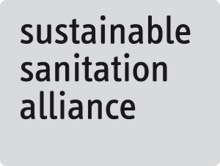
The Sustainable Sanitation Alliance (SuSanA) is a loose network of organizations who are "working along the same lines towards achieving sustainable sanitation".[1] It began its work in 2007, one year before the United Nations International Year of Sanitation in 2008. The intention of creating SuSanA was to have a joint label for the planned activities for 2008 and to align the various organizations for further initiatives.
SuSanA has over 360 partner organizations and over 13,000 individual members (as of March 2021).[2][3] SuSanA's vision document contains a definition of sustainable sanitation which was developed by SuSanA partners in 2007.[4] The discussion forum that is hosted by SuSanA performs like a Community of Practice (CoP).
SuSanA is not a non-governmental organization (NGO). It has no legal structure and takes no membership fees. It encourages other organizations to join the network and to become active members in the thematic working groups.
The SuSanA secretariat is funded by the German Ministry for Economic Cooperation and Development which has commissioned the Deutsche Gesellschaft für Internationale Zusammenarbeit (GIZ) for this task. Other SuSanA partners make contributions for example by paid time of their staff members. Between 2012 and 2018, co-funding for the online Discussion Forum, project database, Wikipedia editing and other improvements to the SuSanA website was provided by the Bill and Melinda Gates Foundation.
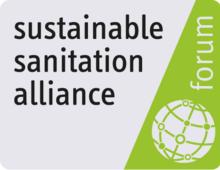
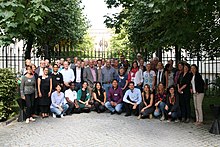

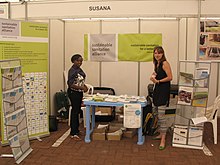


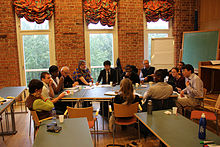
SuSanA is dedicated to achieving the Sustainable Development Goals, and in particular SDG6 (Goal Number 6) which is "water and sanitation for all".[1] This is done by promoting sustainable sanitation systems. These systems should be "economically viable, socially acceptable, technically and institutionally appropriate, and protect health, the environment and natural resources".[5]
SuSanA is one of several knowledge management platform in the WASH sector such as the LinkedIn Discussion Group "Community of Practice on Sanitation and Hygiene in Developing Countries" by WSSCC (now defunct), Blue Planet, International Water Association (IWA), Akvopedia and others.[6]
Since 2007, SuSanA has held 23 meetings in different locations around the world. Each year one meeting takes place before or after the World Water Week in Stockholm, and a further meeting usually takes place in the Global South, connected to another WASH event. SuSanA also organises side events, seminars and working group meetings in conjunction with other major WASH conferences.[citation needed]
SuSanA members are contributing to Wikipedia articles on WASH-related topics.[7] They are particularly active just before two international observance days: World Water Day on 22 March and World Toilet Day on 19 November.[8][7] They have also set up a list of "List of abbreviations used in sanitation".[9]
SuSanA has no legal structure, budget nor income. Partners contribute time and resources from their own budgets. The SuSanA secretariat is funded by the German Ministry for Economic Cooperation and Development (BMZ) who has commissioned the Deutsche Gesellschaft für Internationale Zusammenarbeit (GIZ) GmbH. Between 2012 and 2018, co-funding for the online Discussion Forum and other improvements to the SuSanA platform was provided by the Bill and Melinda Gates Foundation.[10][11][12]
Several active core group partners, for example SEI, seecon, BORDA, Swiss Federal Institute of Aquatic Science and Technology, IWA, and WASTE, have also funded various travel costs of SuSanA members, seminars, the printing of SuSanA publications and so forth.[10]
In 2020, the Water Supply and Sanitation Collaborative Council announced a stronger collaboration with SuSanA by merging their Community of Practice group into the SuSanA Discussion Forum, including financial support to the moderation of the SuSanA Discussion Forum.[13]
The activities of the SuSanA network have contributed to increasing awareness about sustainability in the sanitation sector. SuSanA members were active in the Post-2015 Development Agenda and helped to shape the Sustainable Development Goals where Goal Number 6 now includes a goal of universal use of sustainable sanitation services that protect public health and dignity.[citation needed]
Other actors have picked up on the theme of innovative sanitation (often with reuse of excreta in some form), most notably the Bill and Melinda Gates Foundation. Sustainable sanitation has become a topic in the nexus (water, energy, food) dialogue as well as in the WASH and nutrition theme.[14]
SuSanA fulfills an "intermediary role" in a global innovation system. It was found to be a "prime mover" in the development of "safely managed non-grid sanitation".[15]
SuSanA has 13 thematic working groups covering areas of sustainable sanitation where conceptual and knowledge management work is required:[16]
SuSanA has over 360 partner organizations (as of March 2021).[2] The partners are of the following types: Local NGO, International NGO, private sector, research and education, governmental / state-owned organization, multi-lateral organizations, associations and networks and others.[10] All prospective new SuSanA partner organizations have to agree to the vision document when they join.[citation needed]
Anetwork analysis study conducted in 2014 assessed the SuSanA network by examining the communication channels used and the quality of relationships among partners.[17] It found that "SuSanA partners have strong levels of trust, cooperation and information exchange with one another". However, partners seem to have low diversity of relationships with partners in different economic zones, such as developing countries versus developed countries.[17] Many of the partners use their membership primarily to receive information from the discussion forum.[17]
Individuals can join as members. There are nearly 13,000 members (as of March 2021).[3]
SuSanA has been criticized by some in the WASH (Water, Sanitation, Hygiene) sector for a perceived dominance of the ecosan theme in SuSanA. This is due to the strong focus of two of its founding organizations on ecosan: Stockholm Environment Institute and Deutsche Gesellschaft für Internationale Zusammenarbeit (GIZ) GmbH. Others have criticised SuSanA for being too focussed on technologies and sanitation systems (rather than on non-technical issues); that it is too dominated by people from the Global North; too dominated by GIZ who leads the secretariat; and too theoretical and far removed from the realities on the ground.[citation needed]
The activities of SuSanA so far have a tendency to take place and be driven by actors in the Global North, especially by European actors.[15] To overcome this to some extent, SuSaA set-up local "chapters" in India in 2016, West Asia and North Africa (WANA) in 2017, and Latin America in 2018.[15]
SuSanA has no regional nodes, offices or secretariats. It also has limited impact so far in the non-English speaking parts of the world, notably Russia or Central Asia.
The SuSanA core group has reacted to these criticisms by defining a mission statement in 2014, a roadmap for 2013 onwards and by hosting an open discussion forum where such issues can be discussed.[10] Recommendations made in 2014 to the SuSanA network for its future development and to further develop relationships among partners include: Continue to hold meetings in different locations around the world, establish regional nodes, re-activate the working groups, and create more active members through engagement.[17]
SuSanA started in January 2007 with a first meeting in Eschborn, Germany, at Deutsche Gesellschaft für Internationale Zusammenarbeit (GIZ) GmbH, an international enterprise owned by the German Federal Government. GIZ agreed to host SuSanA's secretariat and has been doing so since 2007. The reason why SuSanA was started in 2007 was to prepare for the International Year of Sanitation in 2008, and to align the organizations active in sustainable sanitation.[18]
A research project in 2020 has split the development of SuSanA into the following phases:[15]
Wikipedia's health care articles can be viewed offline with the Medical Wikipedia app.